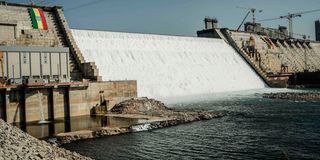River Nile’s Renaissance Dam talks resume between Egypt, Ethiopia, Sudan

The Grand Ethiopian Renaissance Dam in Guba, Ethiopia, on February 19, 2022. Ethiopia's massive hydro-electric dam project on a tributary of the Nile had raised regional tensions notably with Egypt, which depends on the huge river for 97 percent of its water supply.
Cairo, Egypt
Egypt announced on Sunday that negotiations had resumed over Ethiopia's controversial mega-dam, after agreeing last month to reach a deal following years of tensions between the two countries.
For years at loggerheads over the issue, Egyptian President Abdel Fattah al-Sisi and Ethiopian Prime Minister Abiy Ahmed had agreed in July to finalise a deal within four months.
The two leaders met on the sidelines of a summit of African leaders from war-torn Sudan's neighbours seeking to end the conflict that has raged there for over four months.
"A new round of negotiations on the Renaissance Dam began Sunday morning in Cairo, with the participation of the Egyptian, Sudanese and Ethiopian delegations," the Egyptian Ministry of Water Resources and Irrigation announced.
The massive $4.2-billion Grand Ethiopian Renaissance Dam (GERD) has been at the centre of a regional dispute ever since Ethiopia broke ground on the project in 2011, with Egypt fearing it will slash its share of Nile water.
The current talks aim to reach an agreement that "takes into account the interests and concerns of the three countries," Egyptian irrigation minister Hani Sewilam said, urging "an end to unilateral measures".
Ethiopia announced in June it was launching the fourth filling of the reservoir, despite constant objections by Egypt and at times Sudan -- both downstream of Ethiopia on the Nile.
Protracted negotiations over the filling and operation of the dam since 2011 have thus far failed to bring about an agreement between Ethiopia and its downstream neighbours.
Egypt has long viewed the dam as an existential threat, as it relies on the Nile for 97 percent of its water needs.
The dam is nonetheless central to Ethiopia's development plans, and in February 2022 Addis Ababa announced that it had begun generating hydroelectric energy for the first time.





